Our Blog
Animal Shelters Deserve Our Thanks

Animal Shelters do really hard work. November 7 – 13 is National Animal Shelter Appreciation Week for 2020. It is the humble opinion of this writer that one week of recognition is not nearly enough for these hard working people. I know how hard they work and we all absolutely need to show them some love!
Not the Dog Catcher Anymore
There was a time when people who worked in animal sheltering were looked upon as nothing more than “dog catchers.” They caught stray pets and took them to the “pound.” While at the pound animals languished in cages until they were euthanized.
Animal sheltering is vastly different now. Animal shelters and their workers provide care and a safe haven for lost, abandoned, sometimes injured and unwanted pets.
Shelters vs. Rescues
Private rescues now take on the task of sheltering right along with actual animal shelters. Government municipalities operate animal shelters and private organizations often operate rescues. Many rescues operate with the use of foster homes.
Foster homes are the most needed commodity. Unfortunately, foster homes are usually in the shortest supply. Foster “parents” care for homeless animals in their homes until the animal is adopted. This benefits future adopters in many ways.
- Foster homes socialize animals with people and sometimes with other animals.
- Foster homes provide house training. This would be much more difficult in an animal shelter environment.
- Being in a foster home also allows them to receive some behavior training.
- Being in a foster home allows the foster family to learn the likes and dislikes of the pet which they can pass along to the adopter.
All of these things can make for a more successful adoption. Fostering can be a lot of work on the part of foster parent and certainly warrants appreciation. In spite of the work, nothing beats the satisfaction of knowing your foster pet got his forever home because of the work you did!
Who Are These Workers?
Some shelter workers earn a salary to care for the animals in their charge. You may not know that many if not most who care for these animals are volunteers! It may surprise some but people volunteer to make the lives of animals better. This is certainly cause for appreciation and celebration!
Organizations like the Helotes Humane Society consist of mostly volunteers. Volunteers are the only way organizations like these survive.
What Can You Do To Help?
If you want to help, get involved. Being involved and committed is a great way to show your appreciation for the hard work that happens at animal shelters. Call you local animal shelter or visit their website to learn more about volunteer opportunities.
Most animal shelters have opportunities for volunteers that include
- Fostering animals
- Helping with fundraisers
- Helping at public events
- Picking up donations
- Sorting donated items
- Walking/bathing/training dogs
- Helping at adoption events
If you do not want to volunteer, donate! Donating is another great way to not only show appreciation but also to support the organization.
COVID-19 and Animal Shelters
If you are even considering supporting your local animal shelter or rescue there has never been a better time!
The pandemic affected rescues negatively. Because of the need for social distancing, adoption events did not take place regularly. Fundraising has also been limited because of the pandemic. Now is the time to support and donate to these amazing organizations that do the community’s work with animals.
San Antonio Animal Shelters are Getting Some Help
The city of San Antonio recently passed a law to allow the sale of only rescued dogs and cats at pet stores starting in January 2021. This will allow pet stores to have rescued pets for adoption.
Hopefully this law will help more homeless pets get adopted. If you are looking for a new best friend, please consider rescuing a pet in need. After all, this is also a great way to show your gratitude to all the animal shelter workers and volunteers out there.
Is A Senior Pet Right For You?

Adopt-a-Senior-Pet Month is celebrated in November. This is the perfect time to talk about the advantages that come from adopting a senior pet. Whether a senior pet is right for you depends on your lifestyle and what you want from a pet. Read on to see if a senior pet may be right for you.
When Do You Call a Pet a Senior?
Deciding when to call a pet a senior depends on the age and the breed of the pet. Typically, a pet is considered a senior around seven years of age. Even though pets may be considered senior they can still be active for years. They may eventually start to slow down and not participate in as many of their active behaviors. We consider these their geriatric years.
Pinning down a specific set of years to assign to each life stage is difficult. Much of this depends on the pet’s breed and size. Larger dogs age faster while small dogs and cats tend to live longer than their larger counterparts.
Considerations for All Adoptions
When you are considering adopting a pet, there are several things to consider before you choose the pet.
- Consider your lifestyle. Are you home enough to provide companionship to a pet at all?
- Should you get a cat or a dog? How much responsibility are you prepared to shoulder?
- How much space do you have? Do you have enough room for a small dog or cat but not enough for a large breed dog?
- Don’t forget to factor in the financial responsibility. A pet is a financial responsibility for the life of the pet. You must also be financially able to treat an emergency should one arise.
Once you have answered these questions successfully you can move on to decide if a senior dog is right for you. Senior dogs have already gone through the puppy phase and after an adjustment period should be calmer and less destructive than a puppy. Senior cats may still have plenty of spunk left in them and be ready to pounce on a toy or lie quietly in your lap. Here are some other benefits.
- Minimal to no housetraining (depending on the history of the pet)
- Senior dogs will require a little less training and activity although you can still “teach an old dog some new tricks!”
- You know how your pet will be in advance. Senior pets are already grown and you can see their personalities instantly
- Senior pets usually will be able to settle into your household much easier than a puppy. They are more relaxed and won’t require a 24/7 commitment like a puppy does.

The Benefit of Adopting a Senior Pet
The best part about rescuing a senior pet is that you know you have done something great by adopting one. Senior pets are often overlooked in shelters because people think they want puppies or kittens. Many times if you do your research you will find that a senior pet fits your lifestyle much better.
The best benefit you will get is the years of love and affection you will get from adopting a mellow, older pet. What could be better?
Preparing for Future Care
If you want to know about caring for a senior pet, stay tuned for our next blog or visit our website or Facebook page. You will be able to learn about caring for senior pets and some health issues to watch for.
Where to Adopt?
If you are interested in adopting a senior pet check out the many rescues and shelters in and around the San Antonio area.
- Helotes Humane Society
- Animal Care Services
- San Antonio Pets Alive (SAPA)
- San Antonio Humane Society
- Animal Defense League
There are many other rescues in and around San Antonio including breed specific rescues. You can find these rescues by searching the internet. Remember, it’s about the quality not quantity of time you have to spend with any pet you have so give a senior pet a try!
“Blessed is the person who has earned the love of an old dog.” (or cat) Sydney Jeanne Seward
I Think My Pet Ate Something Poisonous

Do you think that could be poisonous?
Have you ever uttered these words wondering if your pet just ate something that could be poisonous? I think we all have at one time or another. It is not a good feeling! The situation is only compounded when your pet ingests something questionable AFTER your veterinarian has closed for the day or on the weekend.
Does poisonous always equal emergency?
If you suspect your pet could have ingested something poisonous it could very well be an emergency, so the answer is maybe. During emergencies, time is of the essence so I am going to walk you through what you should do if this ever happens to you.
Become familiar with common pet poisons
First, you should become familiar with some common pet toxins. Our website features an article that contains some of the top pet poisons called in to the ASPCA Pet Poison Control. You can visit that article to learn more about these common but sometimes deadly poisonous items for pets.

- Over the counter human medication
- Human prescription medications
- Chocolate
- Mouse and rate poisoning
- Xylitol
- Grapes and raisins
- Vitamin D overdose
- Onions and garlic
- Alcohol
- Caffiene
- FOR CATS: Lilies (Lilium species)
- FOR CATS: Spot-on-flea/tick medication (especially over-the-counter brands that contain pyrethrins)

Some plants are poisonous too
These toxins represent a small sampling of things that pets ingest that end up to be poisonous. Some plants are more toxic to cats than dogs or vice versa. You can find a complete list at the ASPCA Pet Poison Control website. One plant that we have a lot of in the San Antonio area is Sago Palm. Sago Palms are extremely poisonous to dogs if they ingest any part of the plant. The seed or “nut” of the plant is the most toxic part of the plant. Ingestion of this plant can result in liver failure within 2-3 days.

Become familiar with the ASPCA Pet Poison Control Website
This list is by no means exhaustive so your best bet is to check the ASPCA Pet Poison Control (APPC) website if you are considering new plants in your house or yard, or using chemicals for your yard or for controlling pests. You can get quick access to the ASPCA Pet Poison Control website via our app. Visit our website for a link to download our hospital app.
We know it’s poisonous and an emergency, so now what?
Now that you know what things to avoid, let us go back to what to do if you have an emergency with one of these poisons. When your pet ingests something that you think may be poisonous, it is everyone’s first instinct to call your veterinarian. Your first call should actually be to ASPCA Pet Poison Control.
Step 1, call the pet poison experts
The ASPCA hotline staffs veterinary technicians, Veterinarians and Veterinary Toxicologists to help you with your emergency. They have a large database of information (more than almost any veterinary hospital) about commonly ingested items and can advise both you and your veterinarian as to the appropriate course of treatment for your pet.
Many times even if you call our office, our advice to you will be to call poison control first and start a case. Because of their expertise we find that working in concert with them gives us the best opportunity to provide life saving care to your pet. So step 1 is to start a case with APPC.
Step 2, call your vet
Step 2 is to call your vet. This is very close second to Step 1. In fact steps 1 and 2 are almost interchangeable but just know that you will probably still have to do both.
Once your pet is at our hospital we can begin treatment. We will outline the treatment plan for your pet as well as let you know what kind of follow on care will be required.
Above all, don’t wait to seek help!
The most important thing you can remember is not to wait when you suspect that your pet may have ingested something poisonous. Seek treatment as soon as you can because in so many cases the sooner we can intervene with treatment, the better. As always, call us with any questions at 210-695-4455.
When The Heat Goes Up, So Does The Danger of Heatstroke
Surviving the Heat

We are feeling the heat right now! July in Texas is sweltering and we know the heat will get worse moving forward. Hill Country Animal Hospital wants to share some important tips on how to make sure your pets stay safe in the heat this summer.
Summer is a fun time of year! Unfortunately, heat can quickly become dangerous for pets. The number one danger for pets is heatstroke.
Why are pets at risk of heatstroke?
Pets do not dissipate heat through sweating, like humans. The main method of ridding heat in pets is panting. Panting is usually an efficient method of thermoregulation for pets, but it is not as efficient as sweating is for humans. This makes pets at risk for heatstroke.
Did you know that your pet’s coat works to help protect him in the summer too? In the winter his coat serves as insulation to keep him warm and in the heat it protects him by not allowing him to take on too much heat.
You do not need to shave your pet for the summer. Just make sure he is well brushed and rid of his winter undercoat. Your pet’s coat will protect him from sun and insects.
Who is at most risk?
Any pet can become a victim to the heat. The pets listed below are at higher risk for developing heat-related problems.
- Pets who have survived an episode of heat stroke in the past
- Elderly pets
- Pets confined to cars or carriers
- Dogs and cats with short and wide faces (brachycephalic)
- Pets with a heart or breathing condition
- Pets without access to water or shade
- Overweight pets
You should never leave your pet inside a car or carrier without air conditioning.
Brachycephalic dogs are at a higher risk. Their anatomy prevents them from panting and cooling efficiently.
Overweight pets are at risk. Their weight interferes with their body’s thermoregulation. Their weight does not allow them to efficiently radiate heat from their body which allows them to cool down.
What are the signs of a heat stroke?
First, become familiar with the signs of heatstroke. Second, pay close attention to your pet’s behavior in the heat. Third, humidity plays a big role in your pet’s ability to cool down. The more humid the harder it is for your pet to cool. Watch for these signs:
- Confusion, anxious or dazed expression
- Hot to the touch or increased rectal temperature
- Seizures
- Salivation
- Whining
- Heavy panting
- Brick red gums
- Vomiting and/or diarrhea
- Increased heart rate
- Collapsing, stumbling and falling down
- Laying down and reluctant to get up
What if your pet falls victim to the heat?
If your pet becomes overheated, cool your pet down by placing cool (not cold), wet towels over his body. Pay special attention to his armpits, stomach and groin area. DO NOT USE ICE! Cooling MUST be done gradually to avoid shock. You can get first aid tips from the American Veterinary Medical Association here.
You should seek veterinary treatment at the nearest facility immediately! Visit our website for access to emergency facilities. Do not delay or take a “wait and see” approach. THIS IS AN EMERGENCY!
Your veterinarian will manage your dog’s heatstroke with intravenous fluids, any medications necessary and will gradually and safely reduce your pet’s temperature. Laboratory work (blood and urine) will likely be necessary to determine if organ damage has occurred.
Keep in mind that your pet’s temperature will likely be an indication of the severity of the situation. Your pet’s normal temperature is 101F to 102F. A temperature of 103F-104F is considered abnormal or hyperthermic. Pets with a temperature of 106F are usually considered to be a heat-related incident and we begin treatment immediately. Temperatures of 107F-109F can lead to organ failure or death.
Heatstroke can lead to brain damage, kidney damage or failure, muscle damage, liver damage, bleeding or clotting issues, lung damage, bloody diarrhea, seizures and death.
Take Precautions in the Heat
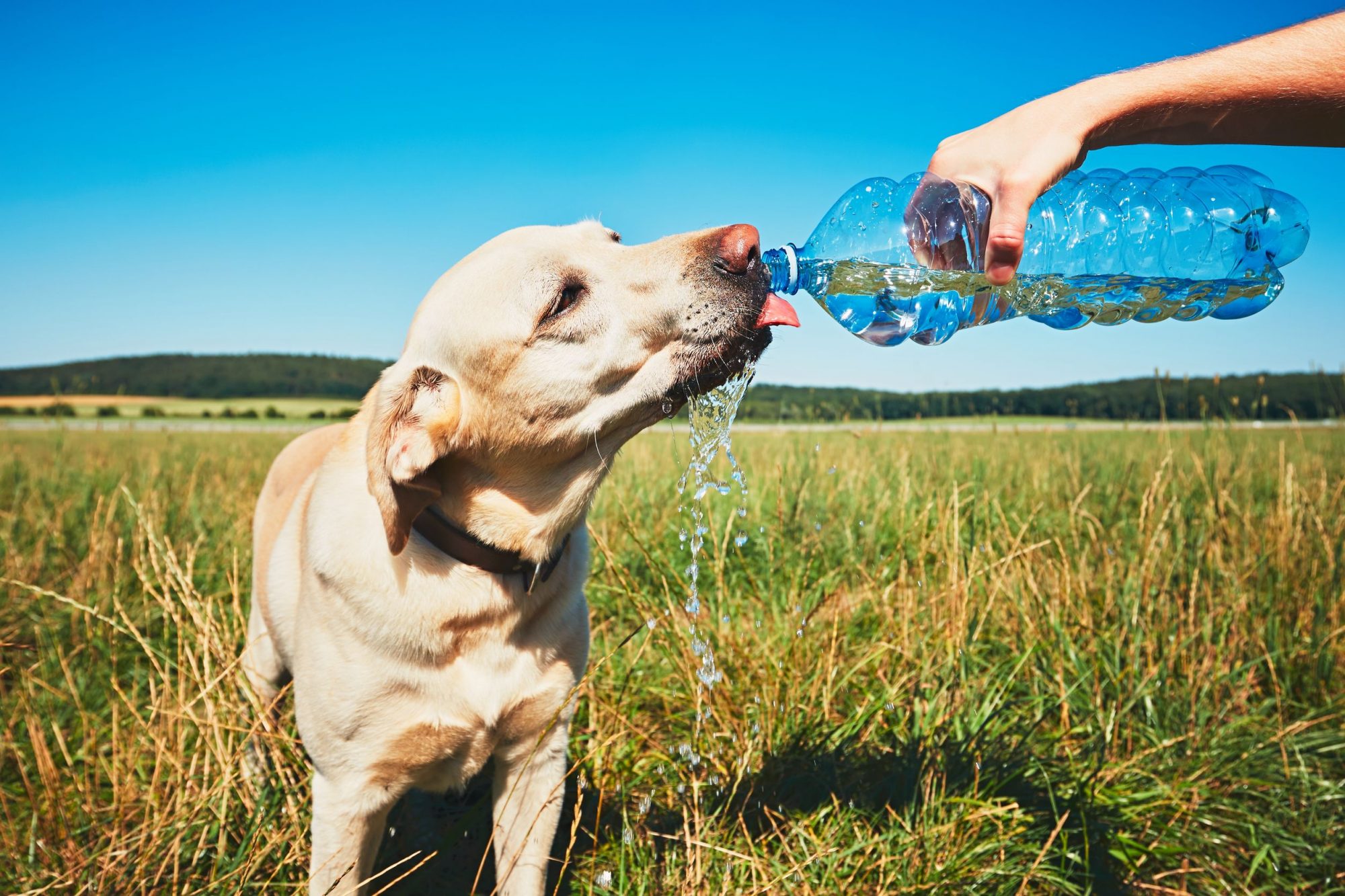
Never leave your pet in your car, even with the windows cracked or in the shade. Use air conditioners to keep the environment cool. Use fans to increase air circulation.
Make sure your pets have access to clean, fresh water at all times. If your pet is outdoors make sure he has access to shade.
Walk your dog in the shade if possible and walk your dogs early in the morning or after 6 pm. If it is not possible to stay in the shade, check the asphalt to make sure it is not too hot for your dog. If you can press the back of your hand on the asphalt for 7 seconds, it should be comfortable for your dog.
Remember, if your pet is outdoors in the heat, it is up to you to monitor his behavior. Pets don’t really understand that they are becoming too hot. If you see any dangerous symptoms, call us at 210-695-4455. Stay safe and have fun with your pet!
COVID-19 Gave Us New Lives
Covid 19, Coronavirus and Pets
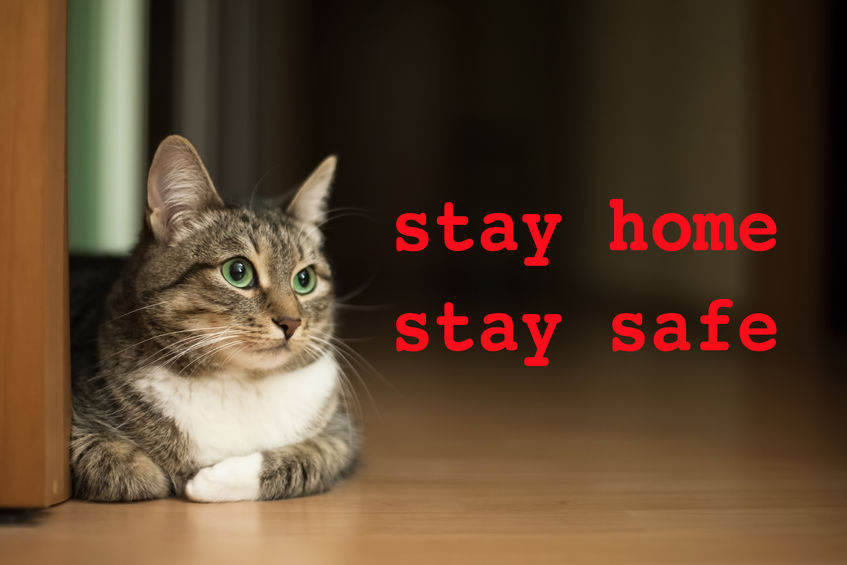
COVID-19 and the Coronavirus are on everyone’s mind right now and rightly so. We want to make sure we provide you with timely and useful information regarding how you and your pet can stay safe and healthy. Read on to learn more about pets and Coronavirus.
Continue…November is Pet Diabetes Awareness Month
While there are some obvious similarities in human diabetes and diabetes in our pets, we tend to approach treatment a little differently in 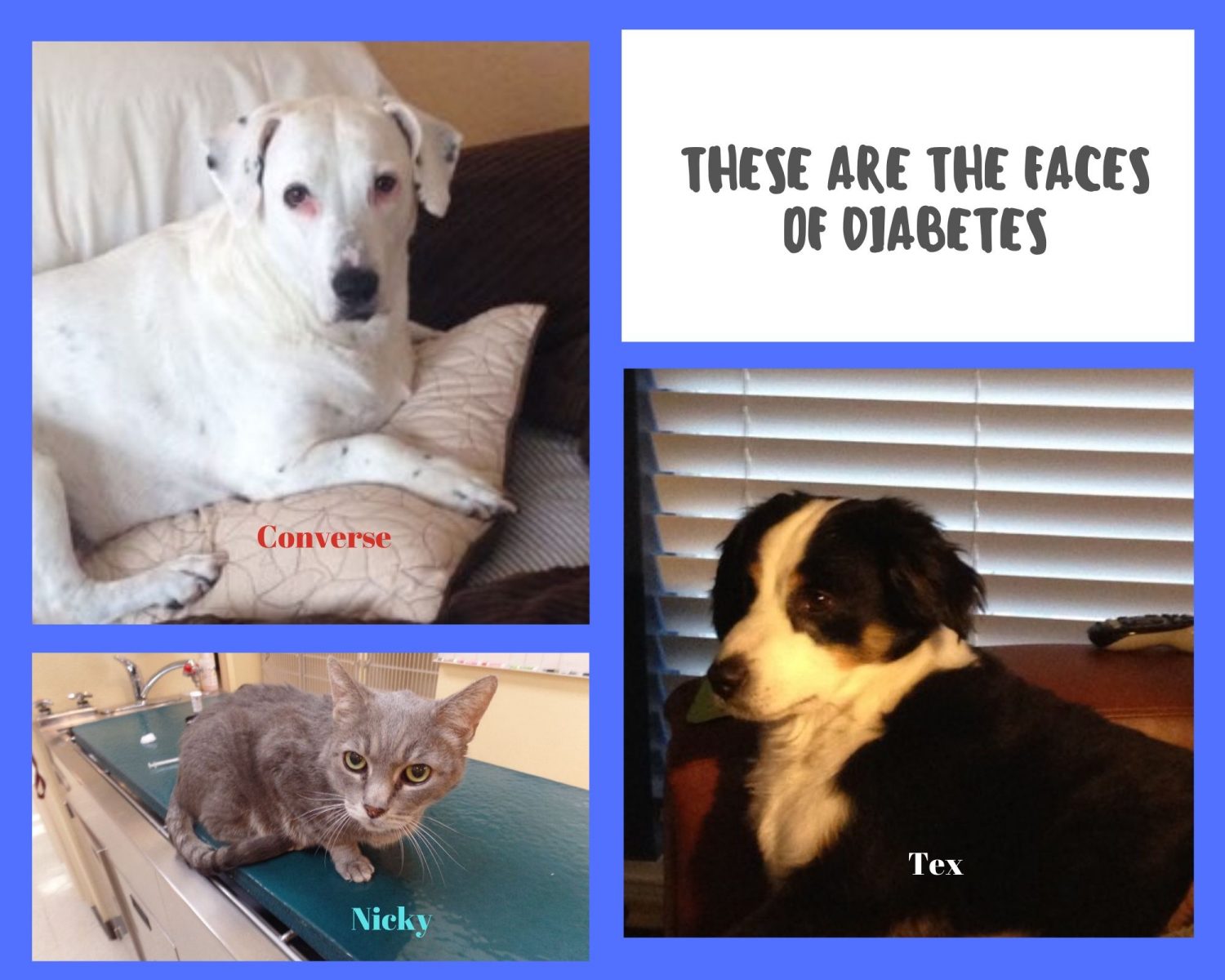 pets. Let’s review and see how much you know about diabetes in pets!
pets. Let’s review and see how much you know about diabetes in pets!
WHAT IS DIABETES?
Diabetes Mellitus occurs when your pet’s body produces too little insulin, stops making insulin completely or has an abnormal response to insulin. Pets and humans alike need insulin so that our bodies can convert glucose into energy to use as fuel.
If we don’t have enough insulin and we cannot convert glucose in our bodies, glucose then builds up and we become Continue…
Does Your Pet Have Anxiety on July 4th?
What is Noise Aversion or Noise Anxiety?
Have you ever wondered if your pet suffers from anxiety that is related to noise like fireworks, thunderstorms or even just loud noises? This is called noise aversion and it is a real problem for many pets.

Since Fourth of July is fast approaching, this is a wonderful time to talk about noise aversion and the anxiety that our furry friends experience. For many people Fourth of July means fun in the sun, cookouts and fireworks. For the rest of us it means hunkering down with our dogs, inside, dreading nightfall and the noise of fireworks going off in our neighborhoods. If you have a dog that has noise aversion or anxiety, you fit right into the second group of people. Unfortunately, this can be a miserable time for your pet and you. Many pets suffer with this type of anxiety during thunderstorms or when loud noises are present. Continue…
National Heat Awareness Day
May 31st is the National Weather Service’s National Heat Awareness Day and this is perfect timing for us to remind you to be careful out there! The heat is something that we are all too used to here in south Texas but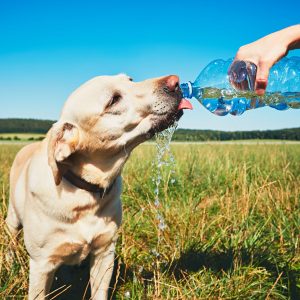 Continue…
Continue…
Be Prepared and Avoid Disaster
Are You Prepared?
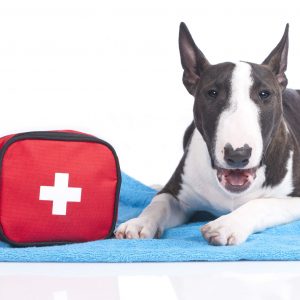 Now is the time to get prepared. Now is the time to review what it takes to be prepared for disaster. May 11th was National Animal Disaster Preparedness Day. Even though the day has passed, we want to help you prepare in the event that you and your pets are ever involved in an evacuation or disaster. Remember, the key to staying safe is to plan ahead. DO NOT wait Continue…
Now is the time to get prepared. Now is the time to review what it takes to be prepared for disaster. May 11th was National Animal Disaster Preparedness Day. Even though the day has passed, we want to help you prepare in the event that you and your pets are ever involved in an evacuation or disaster. Remember, the key to staying safe is to plan ahead. DO NOT wait Continue…
Be Kind To Animals
Celebrate Be Kind to Animals Week
Be Kind to Animals Week is May 5 -11 this year and we could not think of a better subject to blog about! Certainly it seems like common

sense to be kind to animals but in reality life isn’t always like that. We (those of us who work here and you, our clients) all share a common love for animals and we can explore ways that we can be kind to animals all year round.
American Humane brought Be Kind to Animals week to light. This commemoration is the oldest of its kind and is the longest running humane education program in the country. You can check out American Humane here.
